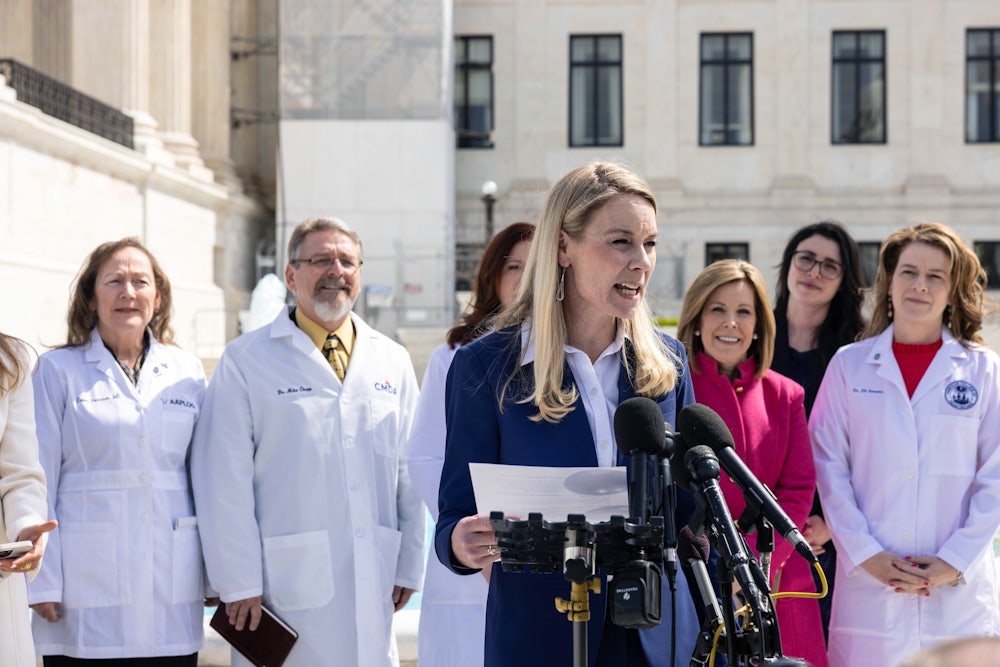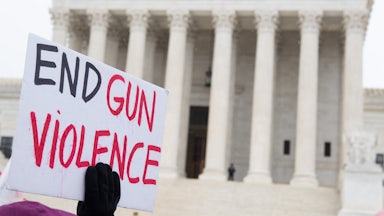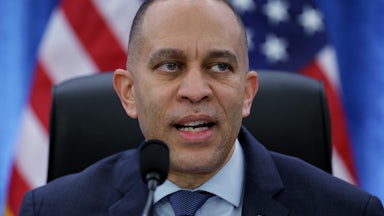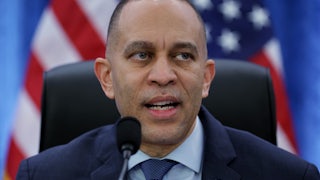Since Eighth Circuit Court of Appeals Judge Duane Benton announced on October 24 that he would take senior status, thus creating a new vacancy for President Donald Trump to fill on a powerful federal appeals court, commentators have speculated about who would take his place. While there are several possibilities, a campaign pushing for one candidate in particular has recently spun up: Erin Hawley, a senior attorney at the Alliance Defending Freedom, or ADF, and the public face of some of the most consequential right-wing legal victories of the last decade. If Hawley is successful, the implications for the people living in the Eighth Circuit’s jurisdiction—stretching across Missouri, Arkansas, Iowa, Nebraska, Minnesota, and the Dakotas—will be profound.
With the ultraconservative Supreme Court at her back, Hawley has been one of the most effective culture-war litigators in the country. She argued Dobbs v. Jackson Women’s Health Organization, the decision that overturned Roe v. Wade and erased nearly 50 years of constitutional protection for abortion. She stood before the court again in 303 Creative v. Elenis, helping secure a ruling that carved out a broad First Amendment exemption to state civil rights laws protecting LGBTQ+ individuals from discrimination. Most recently, she represented Idaho in Moyle v. United States, contending that hospitals should not be required to provide emergency abortions even when a pregnant woman’s life or health hangs in the balance.
For conservatives who believe the court should aggressively dismantle federal protections for reproductive freedom, LGBTQ+ rights, and the administrative state, Hawley is a near-perfect judicial nominee. For everyone else, especially those living in the Eighth Circuit, she represents an alarming escalation of the attack on their civil rights.
To understand what Hawley might do with a lifetime appointment, one must understand the organization where she currently serves as senior counsel and vice president of Center for Life & Regulatory Practice. The Alliance Defending Freedom is now one of the most influential groups on the legal right. Over the past decade, ADF has built a pipeline that feeds handpicked cases into a Supreme Court increasingly receptive to its theory that religious liberty can function as a trump card over civil rights protections and public health regulations.
ADF’s track record reads like a blueprint for a sweeping rollback of modern civil rights law. The group helped engineer the Masterpiece Cakeshop case, seeking to weaken state protections for LGBTQ+ people under the guise of religious freedom. It spearheaded litigation to restrict access to mifepristone in Alliance for Hippocratic Medicine v. FDA, which Hawley argued herself. It has challenged transgender students’ access to sports teams and bathrooms, defending red-state bans on trans participation in public life around the country.
In these fights, Hawley has been a key player. She possesses not only the ideological commitments ADF values but also the institutional polish—Yale Law, Supreme Court clerkship, media savvy, and access to the highest echelons of the Republican Party through her husband, Senator Josh Hawley. Her rise has coincided with ADF’s strategic campaign to install movement-aligned lawyers in federal courts and take advantage of key courts’ personnel changes to advance its agenda. Trump has already appointed several ADF-affiliated judges, and a Hawley nomination to the Eighth Circuit would deepen that pipeline.
What makes Hawley’s potential elevation so significant is the string of cases in which she delivered major conservative victories.
As counsel representing Mississippi in Dobbs, Hawley successfully pressed the argument that the Constitution contains no right to abortion, an argument that had been rejected many times over in the previous decades, but with a 6–3 Republican majority, the court embraced it in full, leaving reproductive rights to the whims of state legislatures. The Eighth Circuit already contains some of the country’s strictest abortion bans. A judge who helped end Roe and leads ADF’s campaign against reproductive rights could shape the next wave of litigation over criminalization, interstate travel, and fetal personhood claims.
In 303 Creative, Hawley argued that a web designer should be allowed to exclude LGBTQ+ customers despite a Colorado law prohibiting discrimination on the basis of sexual orientation. Despite the fact that the designer had not even started her wedding web design business and no LGBTQ+ client had actually approached her to design their website, the Supreme Court somehow found that she had standing and created a major hole in civil rights protections. The ruling is now being invoked in cases across the country involving everything from wedding venues to health care providers. On the Eighth Circuit, where several states have limited or nonexistent LGBTQ+ protections, the decision could extend even further.
In Moyle v. United States, Hawley argued that Idaho’s abortion ban should supersede federal Emergency Medical Treatment and Labor Act, or EMTALA, requirements. The Biden administration contended that EMTALA obligates hospitals to provide stabilizing care, which sometimes includes emergency abortion. Hawley’s position would allow states to prohibit those procedures even when a patient’s life is in danger. Although the Supreme Court ultimately dismissed the case as improvidently granted, the underlying question remains unresolved and is likely to return to the courts. A Judge Hawley would be poised to shape that new litigation.
It is no surprise, then, that Hawley’s name has surfaced in conservative circles. The Eighth Circuit, already one of the most conservative appellate courts, would be the ideal platform for the movement’s next phase: dismantling federal regulatory authority, weakening protections for reproductive and LGBTQ+ rights, and expanding religious liberty exemptions so sweeping that they effectively supersede neutral laws. Far-right political influencers like the American Family Association’s Vice President Walker Wildmon are already calling for her nomination, and it has been reported that she is actively seeking it herself.
Lower court judicial nominations often receive less scrutiny than Supreme Court fights, but they matter just as much—especially in the appellate courts, where the vast majority of federal appellate cases end. A judge can serve for decades, long after the president who appointed them leaves office. With her age, ideological alignment, and experience engineering high-stakes cultural battles, Hawley would likely serve as a conservative anchor on the Eighth Circuit for a generation.
The conservative legal movement sees this as a feature, not a bug. But for the rest of the country, Hawley’s potential elevation offers a stark reminder that the Supreme Court is not the only battleground. The architects of the post-Roe order are looking for new platforms, and they are focused on courts across the country, especially with the Supreme Court already captured by the right.
A Hawley judgeship would not simply reflect the right’s legal priorities. It would accelerate them. The lawyer who helped end the constitutional right to abortion could soon be shaping the future of reproductive rights, civil rights, and religious liberty across half a dozen states. And unless the public pays attention now, her confirmation may become yet another step in a project that began long before Dobbs and shows no sign of slowing down.










